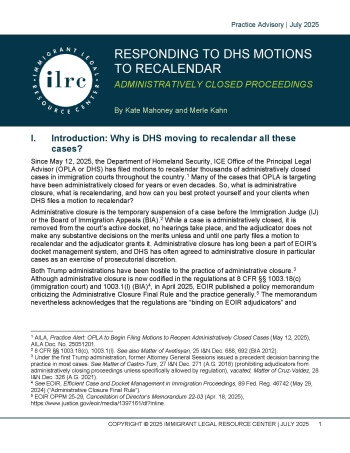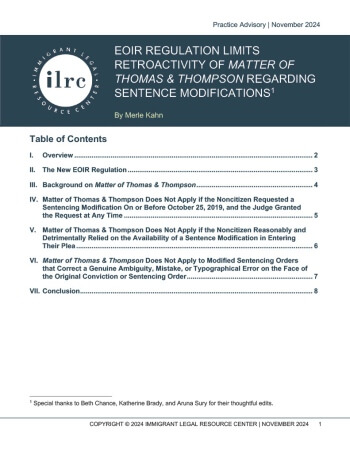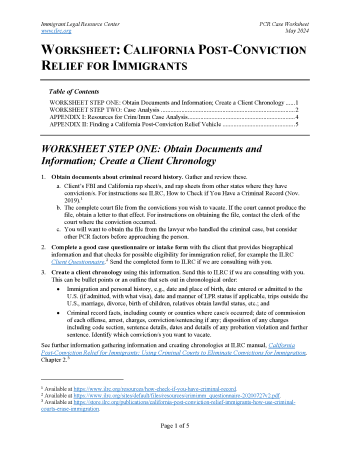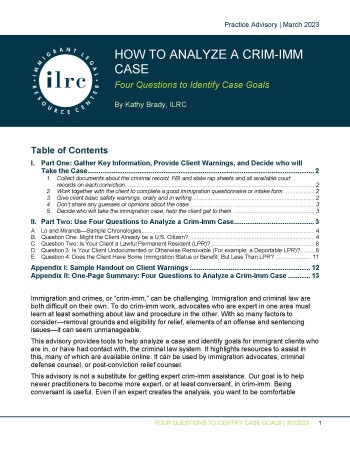Term Page
Post-Conviction Relief
Many noncitizen defendants are already deportable (“removable”). This includes all undocumented people, as well as lawful permanent residents (green card-holders) who have become deportable because of a conviction. If immigration authorities find these people – which is likely to happen – they will be deported unless they are granted some kind of immigration relief. For these defendants, staying eligible to apply for immigration relief is their most important immigration goal, and may be their highest priority in the criminal defense.

In recent months, the Department of Homeland Security has begun filing thousands of motions to recalendar administratively closed proceedings. This trend is raising questions about how attorneys and accredited representatives can respond to these motions and protect their clients’ interests, particularly in cases that have been administratively closed for many years. This advisory explores those questions and offers strategy considerations when determining how to proceed in each case.
This advisory discusses the immigration consequences of a conviction for a controlled substance offense under California Prop 36, specifically Cal. H&S Code § 11395. This advisory explains the immigration consequences of a criminal plea to a Prop 36 controlled substance offense. It outlines criminal defense strategies for defenders to avoid these pleas and outlines removal defense strategies for immigration practitioners where the plea cannot be avoided.

EOIR Regulation Limits Retroactivity of Matter of Thomas & Thompson Regarding Sentence Modifications
On October 25, 2019, the Attorney General published Matter of Thomas & Thompson holding that adjudicators could only recognize a sentence modification for immigration purposes where the sentence was vacated due to procedural or substantive defect as defined in Matter of Pickering. It was not clear whether this holding was retroactive. Under new DOJ regulations it is now clear that Matter of Thomas & Thompson is not retroactive. Adjudicators will recognize a sentence modification as vacating the sentence for immigration purposes where: (1) the person filed for the sentence modification on or before October 25, 2019; (2) the person relied on the availability to seek a sentence modification where the conviction date was on or before October 25, 2019; (3) there was a clerical or typographical error in the sentence regardless of the date of entry of the sentence; or (4) where the sentence was vacated due to a procedural or substantive defect in the sentencing - regardless of when the sentence modification was filed.

Thousands of noncitizens in California are at risk of removal because they have criminal convictions that were unlawfully imposed. California law provides several ways to eliminate these convictions with post-conviction relief (PCR). The challenge is that there are not enough PCR experts to meet the need, especially for low-income immigrants.
Criminal Convictions can have serious consequences on peoples’ lives – especially non-citizens who wish to stay in the United States. Many immigration benefits have criminal bars, meaning that certain convictions will prevent you from getting a lawful immigration status, like permanent residence (green card). This Community Explainer offers some options for those who have had certain convictions related to domestic violence or human trafficking, with insights about how to define these crimes, some example scenarios, and explanations about the benefits of a legal tool called a “vacatur.”
Disrupting Deportation – How to Effectively Vacate your Noncitizens Criminal Convictions for Immigration Purposes
Crimes
Post-Conviction Relief
Since the federal government has failed to provide immigration reform, often times the only way to prevail in immigration court is to vacate your client’s prior criminal conviction or sentence to avoid deportation or to render your client eligible...
California Post-Conviction Relief for Immigrants: How to Use Criminal Courts to Erase the Immigration Consequences of Crimes
Crimes
Post-Conviction Relief
California Post-Conviction Relief for Immigrants: How to Use Criminal Courts to Erase the Immigration Consequences of Crimes guides advocates through how to use criminal courts to erase or mitigate the immigration consequences of convictions. This...

Immigration and crimes, or “crim-imm,” can be challenging. Both immigration and criminal law are difficult on their own. To do crim-imm work, advocates who are expert in one area must learn at least something about law and procedure in the other. It can be hard to know where to start the analysis.
This advisory provides a step-by-step approach to help advocates analyze a case and identify goals. It can be used by criminal defense counsel, immigration advocates, and post-conviction relief counsel. It is not a substitute for consulting with a crim/imm expert, but using it should increase your expertise and help you to better discuss the analysis with the client, argue it to the judge or official, or negotiate with the other side.
This advisory provides a step-by-step approach to help advocates analyze a case and identify goals. It can be used by criminal defense counsel, immigration advocates, and post-conviction relief counsel. It is not a substitute for consulting with a crim/imm expert, but using it should increase your expertise and help you to better discuss the analysis with the client, argue it to the judge or official, or negotiate with the other side.
Cannabis legalization has long been a growing theme across the United States, having a place in virtually every recent election cycle and in policy debates related to the federal government’s role in restricting its access, sale, use, and distribution. With many states moving to legalize cannabis for recreational use and with the Biden administration recently deciding to pardon individuals for certain federal convictions related to its possession, it may seem as though we are coming to the end of the cannabis prohibition era. Unfortunately, not only is that moment yet to arrive, but the dangers for immigrants, in particular, could not be higher. This downloadable guide walks through the current intersection of cannabis, criminal, and immigration law and also shares insights about what a pathway out of prohibition could look like.